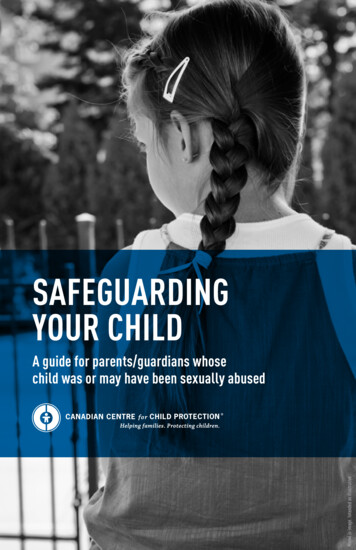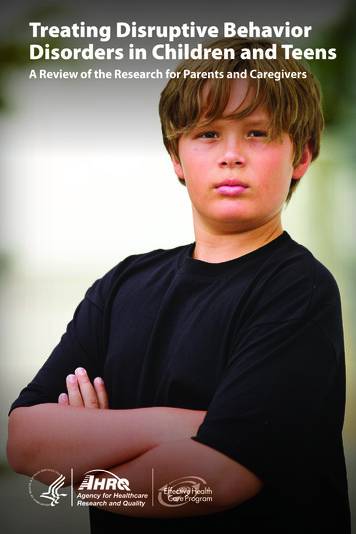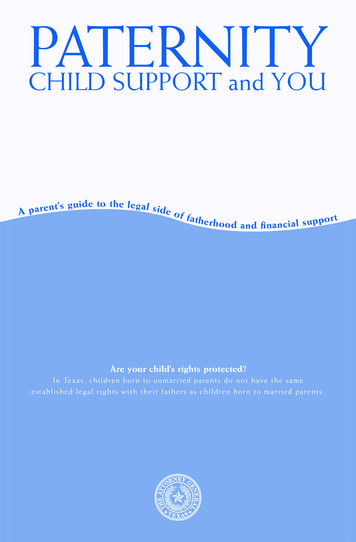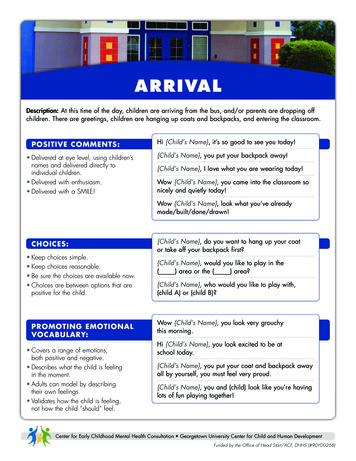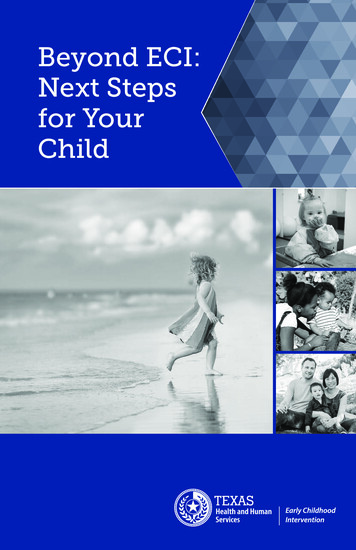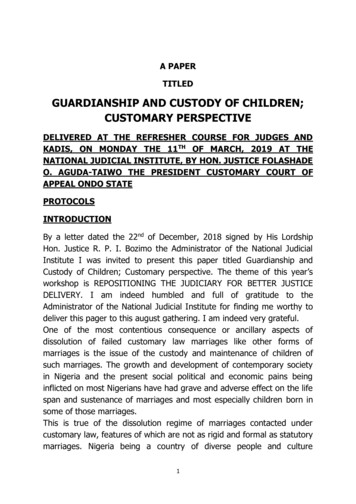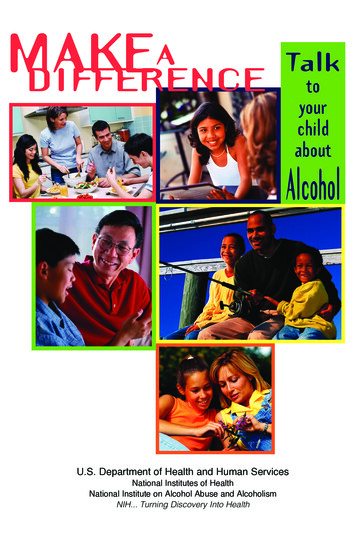
Transcription
AMAKEDIFFERENCETalktoyourchildaboutAlcoholU.S. Department of Health and Human ServicesNational Institutes of HealthNational Institute on Alcohol Abuse and AlcoholismNIH. Turning Discovery Into Health27283 NIAAA Make a Difference Reprint v02.indd 15/12/21 4:43 PM
TalktoyourchildaboutAlcohol27283 NIAAA Make a Difference Reprint v02.indd 25/12/21 4:43 PM
CONTENTSIntroduction .3Your Young Teen’s World. 5The Bottom Line:A Strong Parent-ChildRelationship .7Talking With YourTeen About Alcohol .10Taking Action:Prevention Strategiesfor Parents. 15Could My Child Developa Drinking Problem?.19Resources . 2327283 NIAAA Make a Difference Reprint v02.indd 15/12/21 4:43 PM
QUICK FACTSKids who drink are more likely to be victims ofviolent crime, to be involved in alcohol-related trafficcrashes, and to have serious school-related problems.You have more influence on your child’s values anddecisions about drinking before he or she begins touse alcohol.Parents can have a major impact on their children’sdrinking, especially during the preteen and earlyteen years.227283 NIAAA Make a Difference Reprint v02.indd 25/12/21 4:43 PM
INTRODUCTIONWith so many drugs available to young people these days, youmay wonder, “Why develop a booklet about helping kids avoidalcohol?” Alcohol is a drug, as surely as cocaine and marijuana are.It’s also illegal to drink under the age of 21. And it’s dangerous. Kidswho drink are more likely to: Be victims of violent crime. Have serious problems in school. Be involved in drinking-related traffic crashes.This guide is geared to parents and guardians of young people ages10 to 14. Keep in mind that the suggestions on the following pagesare just that—suggestions. Trust your instincts. Choose ideas you arecomfortable with, and use your own style in carrying out the approachesyou find useful. Your child looks to you for guidance and support inmaking life decisions—including the decision not to use alcohol.“But my child isn’t drinking yet,” you may think. “Isn’t it a littleearly to be concerned about drinking?” Not at all. This is the age whensome children begin experimenting with alcohol. Even if your child isnot yet drinking alcohol, he or she may be receiving pressure to drink.Act now. Keeping quiet about how you feel about your child’s alcoholuse may give him or her the impression that alcohol use is OK for kids.It’s not easy. As children approach adolescence, friends exert a lotof influence. Fitting in is a chief priority for teens, and parents often feelshoved aside. Kids will listen, however. Study after study shows thateven during the teen years, parents have enormous influence on theirchildren’s behavior.The bottom line is that most young teens don’t yet drink. Andparents’ disapproval of youthful alcohol use is the key reason childrenchoose not to drink. So make no mistake: You can make a difference.(Note: This booklet uses a variety of terms to refer to young people ages 10 to 14, includingyoungsters, children, kids, and young teens.)327283 NIAAA Make a Difference Reprint v02.indd 35/12/21 4:43 PM
YOUNG TEENS ANDALCOHOL: THE RISKSFor young people, alcohol is the drug of choice. In fact, alcohol is used by moreyoung people than tobacco or illicit drugs. Although most children under age14 have not yet begun to drink, early adolescence is a time of special risk forbeginning to experiment with alcohol.While some parents and guardians may feel relieved that their teen is “only”drinking, it is important to remember that alcohol is a powerful, mood-alteringdrug. Not only does alcohol affect the mind and body in often unpredictable ways,but teens lack the judgment and coping skills to handle alcohol wisely. As a result:Alcohol-related traffic crashes are a majorcause of death among young people. Alcoholuse also is linked with teen deaths bydrowning, suicide, and homicide.Teens who use alcohol are more likely to besexually active at earlier ages, to have sexualintercourse more often, and to haveunprotected sex than teens who do not drink.Young people who drink are more likely thanothers to be victims of violent crime, includingrape, aggravated assault, and robbery.Teens who drink are more likely to haveproblems with school work and schoolconduct.The majority of boys and girls who drink tend tobinge when they drink.A person who begins drinking as a young teenis four times more likely to develop alcoholdependence than someone who waits untiladulthood to use alcohol.The message is clear: Alcohol use is unsafe foryoung people. And the longer children delay alcoholuse, the less likely they are to develop any problemsassociated with it. That’s why it is so important tohelp your child avoid any alcohol use.What is binge drinking?The National Instituteon Alcohol Abuse andAlcoholism (NIAAA)defines binge drinkingas a pattern of drinkingthat brings blood alcoholconcentration (BAC)to 0.08 percent—or0.08 grams of alcoholper deciliter—or higher.*For a typical adult, thispattern corresponds toconsuming 4 or moredrinks (female), or 5 ormore drinks (male), inabout 2 hours. Researchshows that fewer drinksin the same timeframeresult in the same BAC inyouth; only 3 drinks forgirls, and 3 to 5 drinks forboys, depending on theirage and size.*A BAC of 0.08 percentcorresponds to 0.08 grams perdeciliter, or 0.08 grams per100 milliliters.427283 NIAAA Make a Difference Reprint v02.indd 45/12/21 4:43 PM
YOUR YOUNG TEEN’S WORLDEarly adolescence is a time of immense and often confusing changesfor your son or daughter, which makes it a challenging time forboth your youngster and you. Understanding what it’s like to be a teencan help you stay closer to your child and have more influence on thechoices he or she makes—including decisions about using alcohol.Changes in the Brain. Research shows that as a child matures,his or her brain continues to develop too. In fact, the brain’s final,adult wiring may not even be complete until well into the twenties.Furthermore, in some ways, the adolescent brain may be specifically“wired” to help youth navigate adolescence and to take some of therisks necessary to achieve independence from their parents. This mayhelp explain why teens often seek out new and thrilling—sometimesdangerous—situations, including drinking alcohol. It also offers a possiblereason for why young teens act so impulsively, often not recognizingthat their actions—such as drinking—can lead to serious problems.Growing Up and Fitting In. As children approach adolescence,“fitting in” becomes extremely important. They begin to feel more selfconscious about their bodies than they did when they were youngerand begin to wonder whether they are “good enough”—tall enough,slender enough, attractive enough—compared with others. They lookto friends and the media for clues on how they measure up, and theybegin to question adults’ values and rules. It’s not surprising that thisis the time when parents often experience conflict with their kids.Respecting your child’s growing independence while still providingsupport and setting limits is a key challenge during this time.A young teen who feels that he or she doesn’t fit in is more likelyto do things to try to please friends, including experimenting withalcohol. During this vulnerable time, it is particularly important to letyour children know that in your eyes, they do measure up—and thatyou care about them deeply.527283 NIAAA Make a Difference Reprint v02.indd 55/12/21 4:43 PM
DID YOU KNOW?That according to a recent national survey, 16 percent of eighthgraders reported drinking alcohol within the past month?That 32 percent of eighth graders reported drinking in thepast year?That 64 percent of eighth graders say that alcohol is easy to get?That a recent survey shows that more girls than boys ages 12to 17 reported drinking alcohol?627283 NIAAA Make a Difference Reprint v02.indd 65/12/21 4:43 PM
THE BOTTOM LINE:A STRONG PARENT-CHILD RELATIONSHIPYou may wonder why a guide for preventing teen alcohol use isputting so much emphasis on parents’ need to understand andsupport their children. But the fact is, the best way to influence yourchild to avoid drinking is to have a strong, trusting relationship withhim or her. Research shows that teens are much more likely to delaydrinking when they feel they have a close, supportive tie with a parentor guardian. Moreover, if your son or daughter eventually does begin todrink, a good relationship with you will help protect him or her fromdeveloping alcohol-related problems.The opposite also is true: When the relationship between a parentand teen is full of conflict or is very distant, the teen is more likely touse alcohol and to develop drinking-related problems.This connection between the parent–child relationship and achild’s drinking habits makes a lot of sense when you think about it.First, when children have a strong bond with a parent, they are apt tofeel good about themselves and therefore be less likely to give in to peerpressure to use alcohol. Second, a good relationship with you is likely toencourage your children to try to live up to your expectations, becausethey want to maintain their close tie with you. Here are some ways tobuild a strong, supportive bond with your child: Establish open communication. Make it easy for yourteen to talk honestly with you. (See box “Tips for TalkingWith Your Teen.”) Show you care. Even though young teens may not alwaysshow it, they still need to know that they are important totheir parents. Make it a point to regularly spend one-onone time with your child—time when you can give himor her your loving, undivided attention. Some activitiesto share: a walk, a bike ride, a quiet dinner out, or acookie-baking session.727283 NIAAA Make a Difference Reprint v02.indd 75/12/21 4:43 PM
TIPS FOR TALKINGWITH YOUR TEENDeveloping open, trusting communication between you andyour child is essential to helping him or her avoid alcohol use.If your child feels comfortable talking openly with you, you’llhave a greater chance of guiding him or her toward healthydecisionmaking. Some ways to begin:Encourage conversation. Encourage your child to talk aboutwhatever interests him or her. Listen without interruptionand give your child a chance to teach you something new.Your active listening to your child’s enthusiasms paves theway for conversations about topics that concern you.Ask open-ended questions. Encourage your teen to tellyou how he or she thinks and feels about the issue you’rediscussing. Avoid questions that have a simple “yes” or “no”answer.Control your emotions. If you hear something you don’tlike, try not to respond with anger. Instead, take a fewdeep breaths and acknowledge your feelings in aconstructive way.Make every conversation a “win-win” experience. Don’tlecture or try to “score points” on your teen by showinghow he or she is wrong. If you show respect for yourchild’s viewpoint, he or she will be more likely to listento and respect yours.827283 NIAAA Make a Difference Reprint v02.indd 85/12/21 4:43 PM
Draw the line. Set clear, realistic expectations for yourchild’s behavior. Establish appropriate consequences forbreaking rules and consistently enforce them. Offer acceptance. Make sure your teen knows that youappreciate his or her efforts as well as accomplishments.Avoid hurtful teasing or criticism. Understand that your child is growing up. This doesn’tmean a hands-off attitude. But as you guide your child’sbehavior, also make an effort to respect his or her growingneed for independence and privacy.GOOD REASONS FOR TEENSNOT TO DRINKYou want your child to avoid alcohol.You want your child to maintain self-respect.You want them to know drinking is illegal.Drinking at their age can be dangerous.You may have a family history of alcoholism.927283 NIAAA Make a Difference Reprint v02.indd 95/12/21 4:43 PM
TALKING WITH YOUR TEEN ABOUT ALCOHOLFor many parents, bringing up the subject of alcohol is no easymatter. Your young teen may try to dodge the discussion, and youyourself may feel unsure about how to proceed. To make the most ofyour conversation, take some time to think about the issues you wantto discuss before you talk with your child. Consider too how your childmight react and ways you might respond to your youngster’s questionsand feelings. Then choose a time to talk when both you and your childhave some “down time” and are feeling relaxed.You don’t need to cover everything at once. In fact, you’re likelyto have a greater impact on your child’s decisions about drinking byhaving a number of talks about alcohol use throughout his or heradolescence. Think of this talk with your child as the first part of anongoing conversation.And remember, do make it a conversation, not a lecture! You mightbegin by finding out what your child thinks about alcohol and drinking.Your Child’s Views About Alcohol. Ask your young teenwhat he or she knows about alcohol and what he or she thinks aboutteen drinking. Ask your child why he or she thinks kids drink. Listencarefully without interrupting. Not only will this approach help yourchild to feel heard and respected, but it can serve as a natural “lead-in”to discussing alcohol topics.Important Facts About Alcohol. Although many kidsbelieve that they already know everything about alcohol, myths andmisinformation abound. Here are some important facts to share: Alcohol is a powerful drug that slows down the body andmind. It impairs coordination; slows reaction time; andimpairs vision, clear thinking, and judgment. Beer and wine are not “safer” than distilled spirits (gin, rum,tequila, vodka, whiskey, etc.). A 12-ounce can of beer (about5 percent alcohol), a 5-ounce glass of wine (about 12 percentalcohol), and 1.5 ounces of 80-proof distilled spirits (40percent alcohol) all contain the same amount of alcohol andhave the same effects on the body and mind.1027283 NIAAA Make a Difference Reprint v02.indd 105/12/21 4:43 PM
On average, it takes 2 to 3 hours for a single drink to leavea person’s system. Nothing can speed up this process, includingdrinking coffee, taking a cold shower, or “walking it off.” People tend to be very bad at judging how seriously alcoholhas affected them. That means many individuals whodrive after drinking think they can control a car—but actuallycannot. Anyone can develop a serious alcohol problem, includinga teenager.Good Reasons Not to Drink. In talking with your child aboutreasons to avoid alcohol, stay away from scare tactics. Most young teensare aware that many people drink without problems, so it is importantto discuss the consequences of alcohol use without overstating the case.Some good reasons why teens should not drink: You want your child to avoid alcohol. Clearly state yourown expectations about your child’s drinking. Your valuesand attitudes count with your child, even though he orshe may not always show it. To maintain self-respect. Teens say the best way to persuadethem to avoid alcohol is to appeal to their self-respect—letthem know that they are too smart and have too muchgoing for them to need the crutch of alcohol. Teens alsoare likely to pay attention to examples of how alcoholmight lead to embarrassing situations or events—thingsthat might damage their self-respect or alter importantrelationships. Drinking is illegal. Because alcohol use under the age of21 is illegal, getting caught may mean trouble with theauthorities. Even if getting caught doesn’t lead to policeaction, the parents of your child’s friends may no longerpermit them to associate with your child. Drinking can be dangerous. One of the leading causesof teen deaths is motor vehicle crashes involving alcohol.Drinking also makes a young person more vulnerable tosexual assault and unprotected sex. And while your teenmay believe he or she wouldn’t engage in hazardous1127283 NIAAA Make a Difference Reprint v02.indd 115/12/21 4:43 PM
activities after drinking, point out that because alcoholimpairs judgment, a drinker is very likely to think suchactivities won’t be dangerous. You have a family history of alcoholism. If one or moremembers of your family has suffered from alcoholism,your child may be somewhat more vulnerable todeveloping a drinking problem. Alcohol affects young people differently than adults.Drinking while the brain is still maturing may lead tolong-lasting intellectual effects and may even increase thelikelihood of developing alcohol dependence later in life.The “Magic Potion” Myth. The media’s glamorous portrayal ofalcohol encourages many teens to believe that drinking will make them“cool,” popular, attractive, and happy. Research shows that teens whoexpect such positive effects are more likely to drink at early ages.However, you can help to combat these dangerous myths by watchingTV shows and movies with your child and discussing how alcohol isportrayed in them. For example, television advertisements for beeroften show young people having an uproariously good time, as thoughdrinking always puts people in a terrific mood. Watching such acommercial with your child can be an opportunity to discuss the manyways that alcohol can affect people—in some cases bringing on feelingsof sadness or anger rather than carefree high spirits.How to Handle Peer Pressure. It’s not enough to tell youryoung teen that he or she should avoid alcohol—you also need to helpyour child figure out how. What can your daughter say when she goes toa party and a friend offers her a beer? (See “Help Your Child Say No.”)Or what should your son do if he finds himself in a home where kidsare passing around a bottle of wine and parents are nowhere in sight?What should their response be if they are offered a ride home with anolder friend who has been drinking?Brainstorm with your teen for ways that he or she might handlethese and other difficult situations, and make clear how you are willingto support your child. An example: “If you find yourself at a homewhere kids are drinking, call me and I’ll pick you up—and there will be1227283 NIAAA Make a Difference Reprint v02.indd 125/12/21 4:43 PM
no scolding or punishment.” The more prepared your child is, thebetter able he or she will be to handle high-pressure situations thatinvolve drinking.Mom, Dad, Did You Drink When You Were a Kid?This is the question many parents dread—yet it is highly likely tocome up in any family discussion of alcohol. The reality is that manyparents did drink before they were old enough to legally do so. So howcan one be honest with a child without sounding like a hypocrite whoadvises, “Do as I say, not as I did”?This is a judgment call. If you believe that your drinking or drug usehistory should not be part of the discussion, you can simply tell your childthat you choose not to share it. Another approach is to admit that you diddo some drinking as a teenager, but that it was a mistake—and give yourteen an example of an embarrassing or painful moment that occurredbecause of your drinking. This approach may help your child betterunderstand that youthful alcohol use does have negative consequences.HOW TO HOST A TEEN PARTYAgree on a guest list—and don’t admit party crashers.Discuss ground rules with your child before the party.Encourage your teen to plan the party with a responsiblefriend so that he or she will have support if problems arise.Brainstorm fun activities for the party.If a guest brings alcohol into your house, ask him or her to leave.Serve plenty of snacks and non-alcoholic drinks.Be visible and available—but don’t join the party!1327283 NIAAA Make a Difference Reprint v02.indd 135/12/21 4:43 PM
1427283 NIAAA Make a Difference Reprint v02.indd 145/12/21 4:43 PM
TAKING ACTION:PREVENTION STRATEGIESFOR PARENTSWhile parent–child conversations about not drinking are essential,talking isn’t enough—you also need to take concrete action tohelp your child resist alcohol. Research strongly shows that active,supportive involvement by parents and guardians can help teens avoidunderage drinking and prevent later alcohol misuse.In a recent national survey, 64 percent of eighth graders saidalcohol was “fairly easy” or “very easy” to get and 32 percent reporteddrinking within the last year. The message is clear: Young teens stillneed plenty of adult supervision. Some ways to provide it:Monitor Alcohol Use in Your Home. If you keep alcohol in yourhome, keep track of the supply. Make it clear to your child that you don’tallow unchaperoned parties or other teen gatherings in your home. Ifpossible, however, encourage him or her to invite friends over when youare at home. The more entertaining your child does in your home, themore you will know about your child’s friends and activities.Connect With Other Parents. Getting to know other parentsand guardians can help you keep closer tabs on your child. Friendlyrelations can make it easier for you to call the parent of a teen who ishaving a party to be sure that a responsible adult will be present andthat alcohol will not be available. You’re likely to find out that you’renot the only adult who wants to prevent teen alcohol use—many otherparents share your concern.Keep Track of Your Child’s Activities. Be aware of your teen’splans and whereabouts. Generally, your child will be more open toyour supervision if he or she feels you are keeping tabs because youcare, not because you distrust him or her.Develop Family Rules About Youthful Drinking. When parentsestablish clear “no alcohol” rules and expectations, their children areless likely to begin drinking. Although each family should develop1527283 NIAAA Make a Difference Reprint v02.indd 155/12/21 4:43 PM
agreements about teen alcohol use that reflect their own beliefs andvalues, some possible family rules about drinking are: Kids will not drink alcohol until they are 21. Older siblings will not encourage younger brothers orsisters to drink and will not give them alcohol. Kids will not stay at teen parties where alcohol is served. Kids will not ride in a car with a driver who has beendrinking.Set a Good Example. Parents and guardians are importantrole models for their children—even children who are fast becomingteenagers. Studies indicate that if a parent uses alcohol, his or herchildren are more likely to drink as well. But even if you use alcohol,there may be ways to lessen the likelihood that your child will drink.Some suggestions: Use alcohol in moderation. Don’t communicate to your child that alcohol is a goodway to handle problems. For example, don’t come homefrom work and say, “I had a rotten day. I need a drink.” Let your child see that you have other, healthier ways tocope with stress, such as exercise; listening to music; ortalking things over with your spouse, partner, or friend. Don’t tell your kids stories about your own drinking in away that conveys the message that alcohol use is funny orglamorous. Never drink and drive or ride in a car with a driver whohas been drinking. When you entertain other adults, serve alcohol-free beveragesand plenty of food. If anyone drinks too much at yourparty, make arrangements for them to get home safely.1627283 NIAAA Make a Difference Reprint v02.indd 165/12/21 4:43 PM
HELP YOUR CHILD SAY NOYour child can learn to resist alcohol or anything elsehe or she may feel pressured into. Let him or her knowthat the best way to say “no” is to be assertive—that is,say no and mean it.RESIST THE PRESSURE TO DRINKSay no and let them know you mean it.Stand up straight.Make eye contact.Say how you feel.Don’t make excuses.Stand up for yourself.Don’t Support Teen Drinking. Your attitudes and behaviortoward teen drinking also influence your child. Avoid making jokesabout underage drinking or drunkenness, or otherwise showingacceptance of teen alcohol use. Never serve alcohol to your child’sunderage friends. Research shows that kids whose parents or friends’parents provide alcohol for teen get-togethers are more likely to engagein heavier drinking, to drink more often, and to get into traffic crashes.Remember, too, that in almost every State it is illegal to provide alcoholto minors who are not family members.Help Your Child Build Healthy Friendships. If your child’sfriends use alcohol, your child is more likely to drink too. So it makessense to try to encourage your young teen to develop friendships withkids who do not drink and who are otherwise healthy influences on1727283 NIAAA Make a Difference Reprint v02.indd 175/12/21 4:43 PM
your child. A good first step is to simply get to know your child’s friendsbetter. You can then invite the kids you feel good about to family gettogethers and outings and find other ways to encourage your child tospend time with those teens. Also, talk directly with your child aboutthe qualities in a friend that really count, such as trustworthiness andkindness, rather than popularity or a “cool” style.When you disapprove of one of your child’s friends, the situationcan be tougher to handle. While it may be tempting to simply forbidyour child to see that friend, such a move may make your child evenmore determined to hang out with him or her. Instead, you might trypointing out your reservations about the friend in a caring, supportiveway. You can also limit your child’s time with that friend through yourfamily rules, such as how after-school time can be spent or how lateyour child can stay out in the evening.Encourage Healthy Alternatives to Alcohol. One reason kidsdrink is to beat boredom. So it makes sense to encourage your child toparticipate in supervised after-school and weekend activities that arechallenging and fun. According to a recent survey of preteens, theavailability of enjoyable, alcohol-free activities is a big reason for decidingnot to use alcohol.If your community doesn’t offer many supervised activities,consider getting together with other parents and teens to help createsome. Start by asking your child and other kids what they want to do,because they will be most likely to participate in activities that trulyinterest them. Find out whether your church, school, or communityorganization can help you sponsor a project.1827283 NIAAA Make a Difference Reprint v02.indd 185/12/21 4:43 PM
COULD MY CHILD DEVELOP ADRINKING PROBLEM?This booklet is primarily concerned with preventing teen alcohol use.We also need to pay attention to the possibility of youthful alcoholabuse. Certain children are more likely than others to drink heavily andencounter alcohol-related difficulties, including health, school, legal,family, and emotional problems. Kids at highest risk for alcohol-relatedproblems are those who: Begin using alcohol or other drugs before the age of 15. Have a parent who is a problem drinker or an alcoholic. Have close friends who use alcohol and/or other drugs. Have been aggressive, antisocial, or hard to control froman early age. Have experienced childhood abuse and/or other majortraumas. Have current behavioral problems and/or are failing atschool. Have parents who do not support them, do not communicateopenly with them, and do not keep track of their behavioror whereabouts. Experience ongoing hostility or rejection from parentsand/or harsh, inconsistent discipline.The more of these experiences a child has had, the greater thechances that he or she will develop problems with alcohol. Havingone or more risk factors does not mean that your child definitely willdevelop a drinking problem, but it does suggest that you may need toact now to help protect your youngster from later problems.1927283 NIAAA Make a Difference Reprint v02.indd 195/12/21 4:43 PM
Talking with your child is more important now than ever. If yourchild has serious behavioral problems, you may want to seek helpfrom his or her school counselor, physician, and/or a mental healthprofessional. And if you suspect that your child may be in troublewith drinking, consider getting advice from a health care professionalspecializing in alcohol problems before talking with your teen (seebox “Warning Signs of a Drinking Problem”). To find a professional,contact your family doctor or a local hospital. Other sources ofinformation and guidance may be found in your local Yellow Pagesunder “Alcoholism” or through one of the resources listed at the endof this booklet.2027283 NIAAA Make a Difference Reprint v02.indd 205/12/21 4:43 PM
WARNING SIGNSOF A DRINKINGPROBLEMAlthough the following signs may indicate a problem withalcohol or other drugs, some also reflect normal teenagegrowing pains. Experts believe that a drinking problem is morelikely if you notice several of these signs at the same time, ifthey occur suddenly, and if some of them are extreme in nature.Mood changes: flare-ups of temper, irritability, anddefensiveness.School problems: poor attendance, low grades, and/orrecent disciplinary action.Rebelling against family rules.Switching friends, along with a reluctance to have you getto know the new friends.A “nothing matters” attitude: sloppy appearance, a lack ofinvolvement in former interests, and general low energy.Finding alcohol in your child’s room or backpack, orsmelling alcohol on his or her breath.Physical or mental problems: memory lapses, poorconcentration, bloodshot eyes, lack of coordination,or slurred speech.2127283 NIAAA Make a Difference Reprint v02.indd 215/12/21 4:43 PM
ACTIONCHECKLISTEstablish a loving, trusting relationship with your child.Make it easy for your teen to talk honestly with you.Talk with your child about alcohol facts, reasons not todrink, and ways to avoid drinking in difficult situations.Keep tabs on y
As children approach adolescence, friends exert a lot of influence. Fitting in is a chief priority for teens, and parents often feel shoved aside. Kids will listen, however. Study after study shows that even during the teen years, parents have enormous influence on their children's behavior. The bottom line is that most young teens don't .

